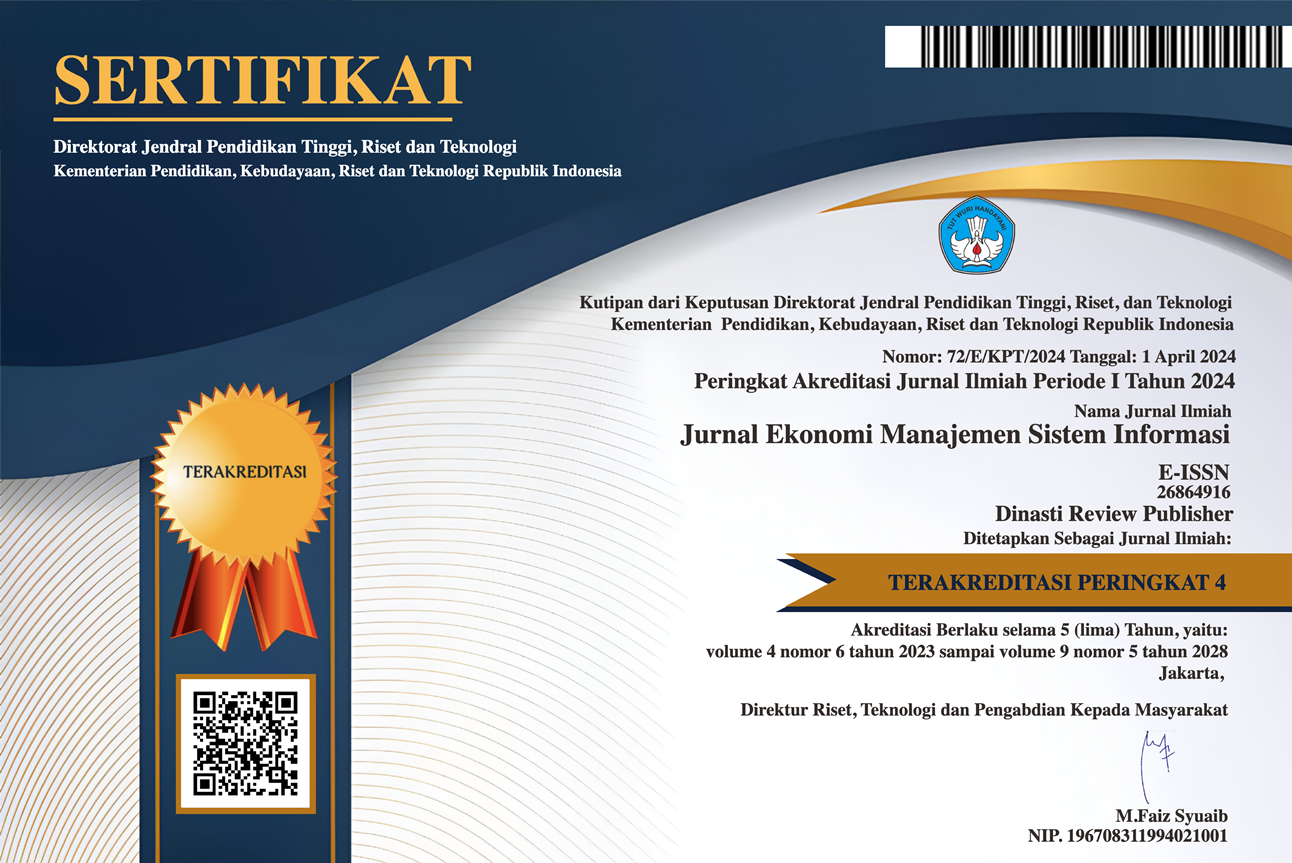The Effect of Religiosity, Halal Knowledge, Subjective Norm on Purchase Intention of Halal Cosmetic Mediated by Attitude Among Millennials in West Sumatera
DOI:
https://doi.org/10.38035/jemsi.v6i4.4406Keywords:
Religiosity, Halal Knowledge, Subjective Norm, Attitude, Purchase Intention, Millennials, Halal CosmeticAbstract
This study examines the impact of Religiosity, Halal knowledge, and Subjective norm on Purchase Intention mediated by Attitude among millennials in West Sumatera. This study uses quantitative methods with purposive sampling of 168 respondents who know and are interested in buying halal cosmetics. Data collection was conducted using Google Forms, distributed online, and analyzed using SmartPLS 4.0. This study explores the impact of religiosity, subjective norm, and halal knowledge on attitude and purchase intention. The results reveal that religiosity and subjective norm positively and significantly influence attitude and purchase intention. Meanwhile, halal knowledge positively and significantly affects attitude but does not significantly affect purchase intention. Additionally, attitude has a positive and significant influence on purchase intention. Furthermore, religiosity, halal knowledge, and subjective norm positively and significantly affect purchase intention through the mediating role of attitude. These findings emphasize the crucial role of consumer attitudes in shaping purchase intention, particularly in contexts influenced by religious, knowledge, and subjective norm.
References
Abou-Youssef, M. M. H., Kortam, W., Abou-Aish, E., & El-Bassiouny, N. (2015). Effects of religiosity on consumer attitudes toward Islamic banking in Egypt. International Journal of Bank Marketing, 33(6), 786–807. https://doi.org/10.1108/IJBM-02-2015-0024
Aghwan, Z., & Regenstein, J. (2019). Slaughter practices of different faiths in different countries. Journal of Animal Science and Technology, 61(3), 111–121.
Amberg, N., & Fogarassy, C. (2019). Green consumer behaviour in cosmetic market. Resources 2019, 8(137), 1–19.
Aoun, I., & Turnois, L. (2015). Building holistic brands: an exploratory study of halal cosmetics. Journal of Islamic Marketing, 6(1), 109–132.
Aslan, H. (2023). The influence of halal awareness, halal certificate, subjective norms, perceived behavioral control, attitude and trust on purchase intention of culinary products among Muslim costumers in Turkey. International Journal of Gastronomy and Food Science, 32. https://doi.org/10.1016/j.ijgfs.2023.100726
Ashraf, S., Hafeez, M. H., Yaseen, A., & Naqvi, A. (2017). Do they care what they believe? Exploring the impact of religiosity on intention to purchase luxury products. Pakistan Journal of Commerce and Social Sciences, 11(2), 428–447.
Ateke, B., & James, D. (2018). Consumer Knowledge and Purchase Intention of Healthcare Product Consumers in Rivers State. Journal of Business and Law Research, 6, 1–7.
Briliana, V., & Mursito, N. (2017). Exploring antecedents and consequences of Indonesian Muslim youths’ attitude towards halal cosmetic products: A case study in Jakarta. Asia Pacific Management Review, 22(4), 176–184.
Derda, I., & Szalaty, P. (2020). Revolutionizing beauty industry: co-creation and customer engagement for brand image development: case study research of a crowdsource-driven cosmetics company volition beauty. International Journal of Marketing, Communication and NewMedia, 8(14), 45–69.
Dewi, C. K., Pradana, M., Garcia, R. H., Rubiyanti, N., & Syarifuddin. (2022). Developing halal consumer behavior and tourism studies: recommendations for Indonesia and Spain. Fronties in Psychology, 13(5), 1–14. https://doi.org/https://doi.org/10.3389/fpsyg.2022.863130
Elgharbawy, A., Azrini, N., & Azmi, N. (2022). HOW EATING HALAL AND TOYYIB CONTRIBUTES TO A BALANCED LIFESTYLE (Vol. 2, Issue 1).
Farhat, K., Aslam, W., & Sany Sanuri, B. M. M. (2019). Predicting the intention of generation M to choose family takaful and the role of halal certification. Journal of Islamic Marketing, 10(3), 724–742.
Fytianos, G., Rahdar, A., & Kyzas, G. Z. (2020). Nanomaterials in cosmetics: recent updates”, Nanomaterials. Nanomaterials, 10(5), 1–16.
Garg, P., & Joshi, R. (2018a). Purchase intention of “Halal” brands in India: the mediating effect of attitude. Journal of Islamic Marketing, 9(3), 683–694. https://doi.org/10.1108/JIMA-11-2017-0125
Garg, P., & Joshi, R. (2018b). Purchase intention of ‘halal’ brands in India: the mediating effect of attitude. Journal of Islamic Marketing, 9(3), 683–694.
Hair, Joseph E, & Jr et al. (2017). A premier on Partial Least Square Structural Equation Modeling (PLS-SEM). SEAGE Publication,Inc.
Handriana, T., Yulianti, P., Kurniawati, M., Arina, N. A., Aisyah, R. A., Ayu Aryani, M. G., & Wandira, R. K. (2020). Purchase behavior of millennial female generation on Halal cosmetic products. Journal of Islamic Marketing, 12(7), 1295–1315. https://doi.org/10.1108/JIMA-11-2019-0235
Haque, A., Shafiq, A., & Maulan, S. (2017). An approach to Islamic consumerism and its implications on marketing mix. Intellectual Discourse, 25(1), 137–154.
Ishak, S., Che Omar, A. R., Khalid, K., Intan, I. S., & Hussain, M. Y. (2019). Cosmetics Purchase Behavior of Educated Millennial Muslim Females. Journal of Islamic Marketing, 11(5), 1055–1071.
Juliana, Azzahra, A. N., Rosida, R., Mahri, A. J., Alamsyah, F. I., & Saripudin, U. (2022). HALAL COSMETICS IN THE EYES OF MILLENNIAL MUSLIMS: FACTOR ANALYSIS OF HALAL LABELS AND CELEBRITY ENDORSERS JEBIS: Jurnal Ekonomi Dan Bisnis Islam, 8(2), 318–333.
Kadengkang, J. A., & Linarti, U. (2020). Pengukuran perilaku dan niat beli produk kosmetik halal melalui modifikasi theory of planned behavior (TPB). Jurnal Ilmiah Psikologi Terapan, 8(1), 25. https://doi.org/10.22219/jipt.v8i1.8769
Kasri, R. A., Ahsan, A., Widiatmoko, D., & Hati, S. R. H. (2023a). Intention to consume halal pharmaceutical products: Evidence from Indonesia. Journal of Islamic Marketing, 14(3), 735–756.
Kasri, R. A., Ahsan, A., Widiatmoko, D., & Hati, S. R. H. (2023b). Intention to consume halal pharmaceutical products: evidence from Indonesia. Journal of Islamic Marketing, 14(3), 735–756. https://doi.org/10.1108/JIMA-06-2021-0192
Kaur, J., Bhardwaj, N., Fernandes, R., Vidya, V., & Farooqui, N. A. (2023). A meta-analytical study on the role of religiosity on purchase intention in the theory of planned behavior. Journal of Islamic Marketing, 14(11), 2845–2870. https://doi.org/10.1108/JIMA-09-2021-0304
Kemenag. (2021). Obat, Kosmetik, dan Barang Gunaan Wajib Bersertifikat Halal. https://kemenag.go.id/read/obat-kosmetik-dan-barang-gunaan-wajib-bersertifikat-halal-3qx3z
Kizgin, Y., & Ozkan, B. (2014). A study on determining the halal food consumption tendencies of the consumers. Business and Management Studies: An International Journal, 2(1), 18–37.
Lada, S., Harvey Tanakinjal, G., & Amin, H. (2009). Predicting intention to choose halal products using theory of reasoned action. International Journal of Islamic and Middle Eastern Finance and Management, 2(1), 66–76. https://doi.org/10.1108/17538390910946276
Maichum, K., Parichatnon, S., & Peng, K. C. (2017). The influence of attitude, knowledge and quality on purchase intention towards halal food: a case study of young non-Muslim consumers in Thailand”. IRA-International Journal of Management and Social Sciences, 6(3), 354.
Mansyuroh, F. A. (2020). The Influence of Perception and Religiosity on the Purchase of Skin Care Without a Halal Label on Generation Z Muslims in Banjarmasin. Proceedings of the Antasari International Conference.
Marmaya, N., Zakaria, Z., & Mohd Desa, M. (2019). Gen Y consumers’ intention to purchase Halal food in Malaysia: a PLS–SEM approach. Journal of Islamic Marketing, 10(3), 1003–1014.
Maulidyah, N. H., Latief, F., & Z, N. (2023). PENGARUH LABELISASI HALAL DAN KUALITAS PRODUK TERHADAP MINAT BELI KOSMETIK WARDAH PADA TOKO SATU SAMA HERTASNING MAKASSAR. Nobel Management Review, 69. https://e-jurnal.nobel.ac.id/index.php/NMaR
Mohezar, S., Zailani, S., & Zainuddin, Z. (2016). Halal Cosmetics Adoption Among Young Muslim Consumers in Malaysia: Religiosity Concern. 6, 47. www.gjat.my
Mukhtar, A., & Butt, M. M. (2012). Intention to choose Halal products: The role of religiosity. Journal of Islamic Marketing, 3(2), 108–120. https://doi.org/10.1108/17590831211232519
Mustafa, K. A. (2019). Developing Halalan Tayyiban Concept in Malaysia’s Food Industry. Halal Journal, 3(3), 97–108.
Ngah, A. H., Ramayah, T., Iranmanesh, M., & Zailani, S. (2023). Halal production, services, consumption, and consumer behavior (Vol. 13, pp. 1–3). https://doi.org/https://doi.org/10.3389/fpsyg.2022.1104099
Nurcahyo, A., & Hudrasyah, H. (2017). The influence of halal awareness, halal certification, and personal societal perception toward purchase intention: a study of instant noodle consumption of college student in Bandung. Journal of Business and Management, 6(1), 21–31.
Nurhayati, T., & Hendar, H. (2019). Personal intrinsic religiosity and product knowledge on halal product purchase intention: Role of halal product awareness. Journal of Islamic Marketing, 11(3), 603–620.
Osman, O. A., & Sulierman, A. M. E. (2023). Halal and Kosher Food: Integration of Quality and Safety for Global Market Trends. Springer Nature.
Rafiki, A., Hidayat, S. E., & Nasution, M. D. T. P. (2023). An extensive effect of religiosity on the purchasing decisions of halal products. PSU Research Review. https://doi.org/10.1108/PRR-07-2022-0093
Rohmatun, K. I., & Dewi, C. K. (2017). Pengaruh Pengetahuan Dan Religiusitas Terhadap Niat Beli Pada Kosmetik Halal Melalui Sikap. ECODEMICA: Jurnal Ekonomi, Manajemen, Dan Bisnis, 1(1).
Rochmanto, B. A., & Widiyanto, I. (2015). Pengaruh pengetahuan produk dan norma religius terhadap sikap konsumen dalam niat mengkonsumsi produk makanan dan minuman Halal (Studi kasus di Kota Semarang). Diponegoro Journal of Management, 4(1), 1–12.
Saputra, A., Alwie, A. F., & Widayatsari, A. (2020). Pengaruh Promosi dan Kualitas Pelayanan terhadap Kepercayaan dan Loyalitas Donatur Dompet Dhuafa Riau (The Effect of Promotion and Quality of Service on the Trust and Loyalty of Dompet Dhuafa Riau). Jurnal Dakwah Risalah, 31(1).
Sari, Z., Tohari, T., & Anjani, D. L. (2022). Analisis Pengaruh Halal lifestyle dan Islamic Branding Terhadap Keputusan Milenial Muslim Untuk Membeli Produk Fashion. Jurnal Manajemen Dakwah, 10, 301–323. http://journal.uinjkt.ac.id/index.php/jmd
Schiffman, L., & Kanuk, L. (2015). Consumer Behavior (11th ed.). New Jersey: Pearson Prentice Hall.
Sekaran, U., & Bougie, R. (2016). Research Method for Business (7th ed.). Wiley.
Shahid, S., Ahmed, F., & Hasan, U. (2018). A qualitative investigation into consumption of halal cosmetic products: the evidence from India. Journal of Islamic Marketing, 9(3), 484–503. https://doi.org/10.1108/JIMA-01-2017-0009
Sugibayashi, K., Yusuf, E., Todo, H., Dahlizar, S., Sakdiset, P., Arce, F. J., & See, G. L. (2019). Halal cosmetics: A review on ingredients, production, and testing methods. In Cosmetics (Vol. 6, Issue 3). MDPI AG. https://doi.org/10.3390/cosmetics6030037
Sumarwan, U. (2014). Perilaku Konsumen, Teori dan Penerapannya dalam Pemasaran (2nd ed.). Ghalia Indonesia.
Suwaryo, P. A. W., & Yuwono, P. (2017). Faktor-faktor yang mempengaruhi tingkat pengetahuan masyarakat dalam mitigasi bencana alam tanah longsor. URECOL, 305–314.
Thomson Reuters. (2018). State of the Global Islamic Economy Report 2018/19. https://www. thomsonreuters.com/en/press-releases/2019/february/ thomson-reuters-reports-fourth-quarter-and-full-year-2018- results.html.
Vizano, N. A., Khamaludin, K., & Fahlevi, M. (2021). The Effect of Halal Awareness on Purchase Intention of Halal Food: A Case Study in Indonesia. Journal of Asian Finance, Economics and Business, 8(4), 441–453. https://doi.org/10.13106/jafeb.2021.vol8.no4.0441
Zahara, M. N., Wildan, D., & Komariah, S. (2020). Gerakan Hijrah: Pencarian Identitas Untuk Muslim Milenial di Era Digital. Indonesian Journal of Sociology, Education, and Development, 2(1), 58–70.
Downloads
Published
How to Cite
Issue
Section
License
Copyright (c) 2025 Kuntum Khaira Ummah, Verinita Verinita, Maruf Maruf

This work is licensed under a Creative Commons Attribution 4.0 International License.
Hak cipta :
Penulis yang mempublikasikan manuskripnya di jurnal ini menyetujui ketentuan berikut:
- Hak cipta pada setiap artikel adalah milik penulis.
- Penulis mengakui bahwa Jurnal Ekonomi Manajemen Sistem Informasi (JEMSI) berhak menjadi yang pertama menerbitkan dengan lisensi Creative Commons Attribution 4.0 International (Attribution 4.0 International CC BY 4.0) .
- Penulis dapat mengirimkan artikel secara terpisah, mengatur distribusi non-eksklusif manuskrip yang telah diterbitkan dalam jurnal ini ke versi lain (misalnya, dikirim ke repositori institusi penulis, publikasi ke dalam buku, dll.), dengan mengakui bahwa manuskrip telah diterbitkan pertama kali di Jurnal Ekonomi Manajemen Sistem Informasi (JEMSI).










































































